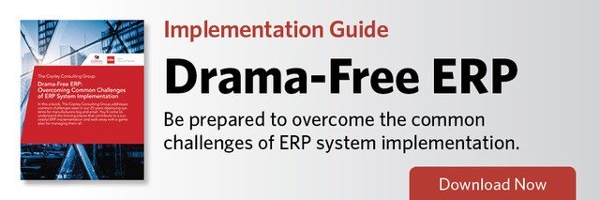In this special blog series, Navigating the ERP System Selection Process, we’ll review the steps manufacturers should be taking to select the right ERP vendor and set themselves up for success throughout implementation. You’ll learn how to define and manage your ERP expectations, strategy and budget while selecting an ERP partner who is right for your business.
 Prior to approving the budget for your ERP system, senior leadership will likely be clamoring for a return on investment (ROI) forecast. Because there are many ways to define and interpret the numbers involved, it is never too early to begin thinking about your approach to this calculation. Below we cover major factors related to both costs and gains some of which can be very difficult to measure. Be sure to review them with your ERP committee, your finance department and expert analysts to ensure consistency and consensus.
Prior to approving the budget for your ERP system, senior leadership will likely be clamoring for a return on investment (ROI) forecast. Because there are many ways to define and interpret the numbers involved, it is never too early to begin thinking about your approach to this calculation. Below we cover major factors related to both costs and gains some of which can be very difficult to measure. Be sure to review them with your ERP committee, your finance department and expert analysts to ensure consistency and consensus.
Costs
The hard costs involved in ERP implementation encompass more than just the total on your vendor invoice. Beyond the vendor’s quote for initial costs, consider whether you’ll need to pay the following ongoing expenses:
- Subscription service: This covers the license fees and subscription fees if you are working with a software-as-a-service (Saas) provider.
- Consultation hours: It is wise to conservatively budget for some additional consultation support, as ERP rollout can sometimes include unexpected complications. Consider the scope of work and man-hours you’ll realistically need so you can draw up an accurate estimate.
- Training: Without appropriate instruction, your ERP users won’t know how to leverage the system to achieve the efficiencies you expect. Budget for a reasonable number of training hours and don’t forget any temporary support that may be needed to cover normal operations during training time.
- Maintenance: In order to mitigate the risk of inefficiency and security hazards it is critical to keep your system up-to-date with software upgrades as time goes on. Be sure to also account for potential hardware upgrades over the life of system, along with help desk support should it be required.
Gains
It’s important to remain realistic and conservative in your estimates on gains from your ERP system. The areas that will be most impactful will depend on the current state of your business. Think back to your ERP system business drivers, which were discussed in the second blog in this series. For example, if you’ve had difficulties with parts and products going missing due to a suboptimal tracking system, loss prevention will carry significant weight in your ROI forecast. Here are other areas where you can expect savings and/or improvements:
- More Accurate Data: When data is warehoused in silos, it can be both an inefficient and error-prone process to pull important business figures together. An ERP system integrates multiple data streams into one source of truth, which can reduce both man-hours and costly errors in your supply chain and/or customer service operations.
- Financial Control: Your ERP system will provide more reliable access to up-to-date data, which will provide a clearer picture of your finances and enhance control of earnings and expenses.
- Business Forecasting: With heightened visibility into your finances, your senior leaders will be equipped to make smarter business decisions. This includes setting more realistic goals, making savvy investments and predicting problems before they can occur.
- Simpler Audits: As mentioned above, the functions and features your ERP system provides will pave the way for more accurate, real-time bookkeeping. When the system is used correctly, this should inherently minimize the odds of accounting errors on your tax return. However, should an audit be requested, investing in an ERP system ensures your records are fully integrated into one easy-to-use database.

